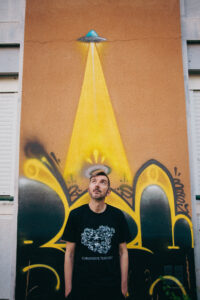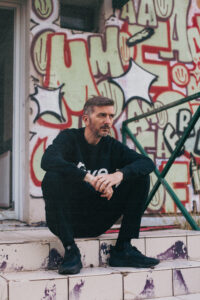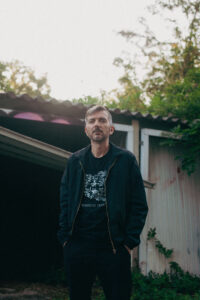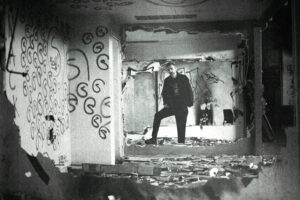Few producers have a sound as characteristic as Umwelt, easily recognizable with his futuristic electro, his powerful techno and his more ambient material. Last year he surprised us with the stunning Dead Eyes Society, undoubtedly, one of the releases of 2022. We will be able to see him live next week at the Ombra festival in a day that will delight electro lovers.
 —How did you get into electronic music? You have cited B.W.P. Experiments and the label Direct Drive as first influences. Were you only listening to trance or did you also enjoy electro?
—How did you get into electronic music? You have cited B.W.P. Experiments and the label Direct Drive as first influences. Were you only listening to trance or did you also enjoy electro?
—It all really started with the arrival of New Beat on the radio in ’88 and my first purchases of 45 bpm maxis. That’s when I really started mixing and getting interested in electronic music. In ’91, with the arrival of Radio Maxximum, things got really crazy, with live broadcasts of the first Parisian raves. In ’93, the rave phenomenon arrived in Lyon and I was lucky enough to find myself at the same time in the first underground venue “L’Hypnotic” and host of the radio show “Teknoland”.
Then it got really serious, and connections started to be made with Belgium and in particular with the BWP Experiment krew with Deg and Acid Kirk, who influenced me a lot; their music and sets were incredible. Direct Drive and Adam X were also a big influence with their dark, industrial techno sound; it was a really new vibe at the time.
I discovered the first electro EPs a little later in ’95 with Drexciya, but especially in the late ’90s and early 2000s, when the electro scene was really prolific with productions by Anthony Rother and labels like Electrix, Scopex, Satamile, Breakin, Rotters Golf Club… There were also a lot of techno EPs featuring electro breaks on the B side. For me, it was the golden age of electro.
—Two producers that you have confessed to admire are Terence Fixmer and The Hacker. How would you consider their influence in your career?
—Yes, I have a lot of respect for them, because they’re important French artists on today’s scene. They have always remained true to a certain aesthetic, and have influenced and continue to influence several generations.
—How was the techno/electro scene in France back then?
—In the 90s, in France, the electro scene was very underground, with very few DJs playing these sounds. I think it was really around the time of the release of Anthony Rother‘s Sex With The Machines album on the techno label Kanzleramt that DJs and the public began to take an interest in this style. But it’s always remained a very underground style.
—You started releasing material in 1997 with the album Zeltron, right? What kind of gear did you had then?
—My first good studio setup with which I released my first EPs was this: TR808, TR505, SH101, Juno 106, JX 3 P, Polysix, FX and Cubase on Atari 🙂
—Talking about gear, you said that you only use hardware, why? Do you think that the limitation helps you being more creative?
—Yes, I did try out the softwares and plugins. At first it was cool because it opened up so many new possibilities, but in the end I lost spontaneity and creativity. That’s why I quickly went back to hardware. With hardware, you’re a little more limited, you have to work with the machine, and that pushes my creativity, it’s more direct, you think less!
—In some of your following works, you started doing electro, like in Tchoukar:EP and …City. You said that Umwelt was like an environment (the meaning in German). Do you think that your fans have understood that? Was it difficult at the beginning to release different styles under the same name?
—Yes, I’ve never developed a side project, because I don’t like the labels you stick on an artist: Electro, Techno, Acid… for me there’s no preference, I just need to like the track and feel an emotion or energy.
—How do you compose your music? You said that you follow mainly your instinct and based on feeling.
—Yes, that’s exactly it, I’m not looking to do one specific thing and I like to develop EPs or albums in line with the label’s aesthetic, like my latest album on Monnom Black, which explores more my Techno side.
—I would like to discuss one sentence that you said: I make music as a DJ don’t worry much about sound. What do you mean with that?
—I was a DJ before I was a producer, and very often when I compose tracks I think of a place in which it could be played and the effect it might have. A sort of personal fantasy 🙂
Even if in the end I try to sound cool, that’s not my priority, and that’s probably what makes my sound atypical. In fact, I’m always surprised when another artist asks me about my production secrets, even though it’s all really artisanal and quite experimental in the process.
—Your music has a certain melancholy. Is it something that you try to put in your work or something that comes naturally?
—Yes, melody and emotion are two things I look for very often. I like the idea that my tracks can be played at parties or listened to quietly at home. As I’m not much of a “DJ tool”, there always has to be something going on.
—In your LPs you have tried different things, i.e Abandon In place, is more ambient. Do you consider it an album for listening at home? And what do you listen to at home?
—Abandon In place and Subversive Territory are clearly more conceptual projects, like a soundtrack that everyone interprets in their own way.
 —Science fiction has been an important influence in your work, mainly for the concepts. Any work that has been specially influence for you?
—Science fiction has been an important influence in your work, mainly for the concepts. Any work that has been specially influence for you?
—Science fiction, dystopia and fantasy are themes that influence me. Like David Cronenberg’s filmography and themes, for example.
—Where did you get the idea for Planeta de las mujeres? It’s one of your releases where the music matches perfectly the concept, giving you the idea of one of those 50s sci-fi movies.
—I came across this 60’s film totally by chance on the internet and found the title interesting for an EP. The domination and extinction of a genus or species has always been used a lot in SF films such as “The last man on earth”, “Planet of the Apes”….
—My wife, who is a big fan of your music, says that your trademark sound can be heard for the first time in the Post Humain EP. Do you consider that as a special release?
—Yes, Post Humain released by Satamile is a work that like the LP that came out on Kommando 6 at the same time, has defined my style. At that time, the Satamile label was very important in the electro scene. It was great for me to release an EP and then an album.
—Subversive Territory, was a like a film score, more ambient again and composed during pandemic. Was it a way of relieving all that you kept during the pandemic, or maybe a way of sharing your doubts and fears? Did you image it as a movie?
—The confinements, the virus, the information, the deaths, the more or less serious illnesses, the vaccinations … in short, the atmosphere was particularly surreal and ultimately very dystopian. That probably influenced me, but I think it was Yann Legendre’s comic book “Flesh Empire” that I read during my confinement that pushed me a little further into this project. I set out to create a kind of sound illustration, a soundtrack to Yann’s magnificent drawings. When I’d finished the album, I asked him if he’d be up for illustrating Subversive Territory. He immediately agreed, and the project was released a few months later.
—Your last work is again powerful techno, called Dead eyes Society as you said before, and released on Dax J’s Monnom Black. It’s a work about the society blinded by a lot of politics, governments and mainstream medias. Do you think that music can open the eyes of the public?
—It would be pretentious and illusory to think so, I think. There are no lyrics on my tracks, I can only try to convey a message through the titles and the style of the track (dark, melancolic …).
—With Rave or Die you have created a very characteristic artistic and conceptual label. Regarding the concept of the series, you said that you asked the guess producer to look for their raver side. How do you select the artists to make a split? What can you please tell us of your EP with legendary Spanish DJ Óscar Mulero?
—Yes, that’s exactly it, to express your rave side. What’s really interesting is that each artist has a different vision, experience and background.
In the case of Óscar, I told him about the project and he immediately agreed, so it was a great honor to have him on the label.
—You press vinyl at home, right? When did you start? Are you making most of your production this way?
—In my studio, I have a machine that burns vinyl by the unit, so I can make a few dubplates for my sets or ultra-limited quantities for certain label releases.
—What are your plans for the future?
—I want to ontinue loving what I do and keeping the passion alive. New EPs and collab projects are coming in 2024…
—What can we expect of your live at Ombra?
—Darkness and Power :)))




